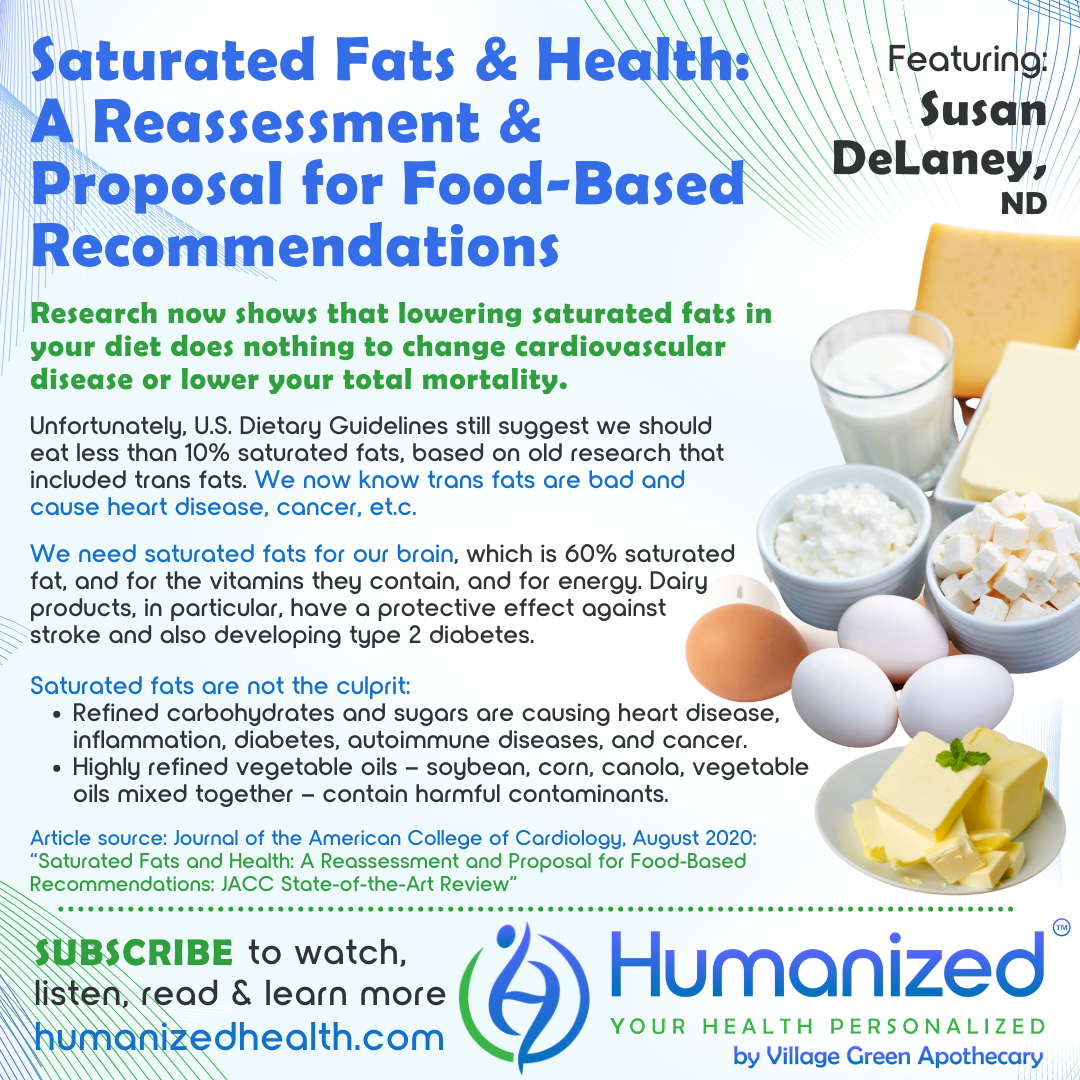Saturated Fats & Health: A Reassessment & Proposal for Food-Based Recommendations
Featuring
Susan DeLaney, ND, RN
WATCH
LISTEN
READ
Rebekah Kelley: Welcome to the Humanized podcast, all about personalizing your health. I’m your host, Rebekah Kelley, and today our topic will be Saturated Fats and Health, a Reassessment and Proposal for Food-Based Recommendations, with Dr. Susan DeLaney. Before I introduce Dr. DeLaney I want to remind everyone to subscribe and get all the other variety of casts in audio, video and transcription at HumanizedHealth.com. I’d also like to thank our lead sponsor, Village Green Apothecary, at MyVillageGreen.com.
A little bit about Dr. Susan DeLaney. She’s practiced naturopathic medicine in North Carolina for over three decades. Over the years, she has observed that the health of many people, including children, has greatly declined while the number of prescriptions has dramatically increased. By using a natural approach to healing, she is able to help people become less dependent on prescription drugs and improve their health and vitality. In her practice, as well as in her lectures, Dr. DeLaney inspires people using up-to-date nutrition science to take personal responsibility for their own health journey. Dr. DeLaney is passionate about educating individuals and their healthcare providers about the benefits of advanced nutrient therapy for balancing biochemistry, as well as the nutritional value of eating real food and healthy fats. Dr. DeLaney’s latest project, Your Health is No Big Deal – It’s a Million Little Things, provides links to 13 educational videos to help people learn more about healthy fats, the importance of fat-soluble vitamins, as well as simple changes individuals can make to improve their health.
Dr. DeLaney, thanks for being with us today.
Susan DeLaney: Well, thanks for having me. I really appreciate the opportunity to talk about one of my favorite subjects, saturated fats, which have been so misaligned for years and years.
Rebekah Kelley: So this is an article, right, that we’re referencing today? So, where can we find this?
Susan DeLaney: This comes from the Journal of the American College of Cardiology in August of 2020. And unfortunately, it didn’t get a lot of press because, if many of you will remember, that’s right as COVID was crashing our country, and also it was pre-election time. So a lot of other things took precedence. But this journal article on saturated fats was nominated as one of the top 20 articles that came out in that year. So it’s a very important article which, given any opportunity to talk about it, I will.
Rebekah Kelley: Well, thank you so much for bringing it to our attention. Obviously, a lot of us were focused on other things, so it’s nice to come back and really revisit it. So why should we talk about it? What is it about it that really makes you want to recommend that we take a look at it?
Susan DeLaney: This article totally reverses the current thinking that we have in this culture that we should eat a low-fat diet. And that has been really part of our food paradigm since the 1980s, when it was recommended that we eat a low-fat diet. And since that time, when that was instituted, people have been getting fatter and fatter and fatter in every age category, and sicker with diabetes, hypertension, cancer, heart disease – on the low-fat diet. So there have been several studies that have tried to make this shift happen. In 2014, Dr. Rajiv Chowdhury and a team of scientists said there’s no real evidence that saturated fat causes heart disease. So this is a perfectly great follow-up. It’s a team of people and they are very clear in this article that lowering saturated fats in your diet does nothing to change cardiovascular disease or lower your total mortality.
So the demon that we have all avoided saturated fat should no longer be the demon. And in fact, that some saturated fats, from dairy in particular, have a protective effect against stroke and also developing type two diabetes. Now, that is not something your doctor will tell you. And so when I learned that the high school science teachers are telling students not to eat eggs because it will increase their cholesterol, and eat a low-fat diet because it [fats] will make them fat, I’m going, I’ve got to say something about this. And so it’s really important that… they have some recommendations that you go back to eating fats as part of a food matrix. And so I think there’s a shift in looking at fats and carbohydrates and proteins and going, oh, this is a part of our total food matrix and we should no longer avoid saturated fats.
However, the U.S. Dietary Guidelines still maintain, and they have, since the ’80s, that our diet should contain less than 10% saturated fats. And also that people who have cardiovascular disease or diabetes should have only 6 to 7% saturated fats in their diet. Which is completely the reverse of the way it should be. So it’s a fascinating article. And one of the things about this article is they go back and review the history of how this came to be. And so these were studies done in the ’60s and ’70s and they reevaluate them. It turns out they had a study that they thought was testing the difference between polyunsaturated fats or unsaturated fats versus saturated fats, and clearly the saturated fats in the study created more harm and caused more heart disease. Well, now that they look at it, the saturated fat group was contaminated with trans fats. That means they were comparing polyunsaturated or unsaturated fats to a saturated and trans fat diet. And now we know that trans fats are really bad for us. And they’re still in the food supply, but less than they were, but they’re the culprit. They were causing the heart disease, the cancer and all that.
So people are going, you mean to tell me that I have been avoiding saturated fats all my life, and they’re not harmful for me? Well, this article clearly says they are not harmful for you. And so that’s why I think it’s important. And we need saturated fats for our brain, which is 60% saturated fat. We need saturated fats for the vitamins that they contain, which I hope to talk about at some other point, and we need them… it’s part of our energy. Because now what we’ve done is substitute refined carbohydrates and sugar into our diets. The American diet at the turn of the century, like 1900, contained about five to eight pounds of sugar per person per year. And now because we’re eating a low-fat diet, the average consumption is 152 pounds of sugar per person per year. So it’s that substitution, this article says, of refined carbohydrates and sugars that are causing heart disease, causing inflammation, causing diabetes, causing cancer. And the list just goes on and on. Autoimmune diseases, because we don’t have the fat that we need and the nutrients that are found in them. And so it should be rated a top article and it was voted one of the top 20 articles of 2020. But the more people that read it, the better off we are.
And another piece that it talks about in this article is that if you’re eating highly refined oils, though they’ve done studies with those oils – that means vegetable oils, soybean, corn, canola, vegetable oils mixed together – that in rat studies, they have been shown to cause cancer. And I say yikes to that because… and then you get those oils and heat them by eating the French fries and other fried foods that we’re eating, and that produces even harmful components, as well. So we think we’ve been doing the right thing by having vegetable oils and frying in them, and other shortening type products and vegetable oils, and we’re doing the wrong thing. Because those become harmful contaminants in our body and people are dying of heart attacks, cancer and other diseases, diabetes at much younger ages than before, as well.
So I found this article to be absolutely fascinating and important. And also they call for a reexamination of public health guidelines to say, hey, you guys need to make some different decisions and protocols here. And he [in the article] said, “There is no robust evidence that current population-wide, arbitrary upper limits on saturated fat consumption in the United States will prevent cardiovascular disease or reduce mortality.” So, enjoy that butter, enjoy that cheese. We don’t advocate eating too much ice cream – but the whipped cream, make your own. Use lots of vanilla, maple syrup, a tiny bit of that, and put it on fruit. That makes an amazing dessert. And you go, oh, I’m eating something healthy. But turning that around in our brains is really, really hard to do.
Rebekah Kelley: You’re making me hungry. It all sounds so delicious. And you’re also now giving me permission because you’re saying it’s good for me. Actually, I love this article.
Susan DeLaney: Yes. This article… and if your doctor tells you to eat a low-fat diet, or you need to do this, you should take it to your doctor. I’ve educated more physicians by sending them this article. They go, really, that’s a complete reversal of what we’ve been taught. I go, yes, it’s a complete reversal of what you’ve been taught.
Rebekah Kelley: But Dr. DeLaney, what you’re saying, I think, if I’m understanding, is that they just really took a look at the data and they separated the fats, versus just lumping them together as one, where the trans fat and the saturated fat, where they separated it and they realized there was a difference? Is that what you’re saying when they say reexamine the data?
Susan DeLaney: Well, they did not understand that the saturated fat arm of the study was contaminated with trans fats. That’s actually what happened, is that it was contaminated by a product they were using in the saturated fat arm. And so the unsaturated fat was polyunsaturated fat. And they came to the conclusion in the ’60s and ’70s, not knowing about the contamination, that it was healthier to have unsaturated fats versus eating saturated fat.
And we also have the Framingham study in 1987 that brought us the same conclusion. But when you really look at the statistics on that, they say there was no difference in the high cholesterol between 205 versus 290 for blood cholesterol levels. And the idea was that saturated fats make your cholesterol go up, therefore, saturated fats and cholesterol are bad for you. So not true. And we can talk about that in another podcast. Cholesterol is not even a fat, by the way.
Rebekah Kelley: That’s really amazing. Thank you so much, Dr. DeLaney, you have such valuable insights. I really love when you visit with us and share your knowledge. Dr. DeLaney can be found at www.TheWellnessAlliance.com. I’m going to spell that. That’s T H E W E L L N E S S A L L I A N C E.com. Let me remind you to subscribe and get access to all Humanized videos, podcasts and transcriptions from all of our thought leaders, like Dr. DeLaney, on personalized health at HumanizedHealth.com. Thanks so much for being with us. I hope you can come back again.
Susan DeLaney: Thanks. I will.









